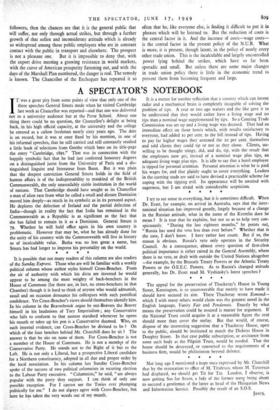A SPECTATOR 'S NOTEBOOK
IT was a great pity from some points of view that only one of the three speeches General Smuts made when he visited Cambridge last week ai Chancellor was reported—and that one was delivered not to a university audience but at the Perse School. About one thing there could be no question, the Chancellor's delight at being back, in his high official capacity, at the university and the college he entered as a callow freshman nearly sixty years ago. The date is on record, but it was at once fixed by his mention, in one of his informal speeches, that he still carried and still constantly studied a little book of-selections from Goethe which bore on its title-page the entry " Cambridge, 1891." That was in connection with the happily symbolic fact that he had just conferred honorary degrees on a distinguished jurist from the University of Paris and a dis- tinguished linguist and litterateur from Bonn. But it was plain that the deepest conviction General Smuts holds in the field of human affairs is of the indispensability to mankind of the British Commonwealth, the only unassailably stable institution in the world of nations. That Cambridge should have sought as its Chancellor a man of alien race from what he called a small and distant Dominion moved him deeply—as much in its symbolic as in its personal aspect. He deplores the defection of Ireland and the partial defection of India—though in reality the fact that India has remained in the Commonwealth as a Republic is as significant as the fact that she has failed to remain in it as a Dominion. General Smuts is 79. Whether he will hold office again in his own country is problematic. However that may be, what he has already done for the unity of his country with the Commonwealth will live in history as of incalculable value. Botha was no less great a name, but Smuts has had longer to impress his personality on the world.
* * * *






































 Previous page
Previous page